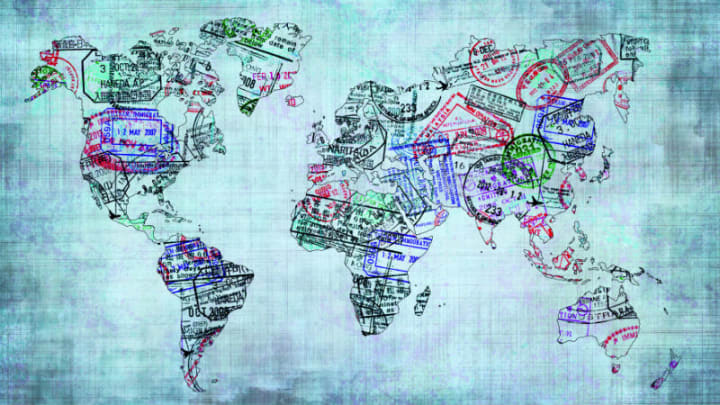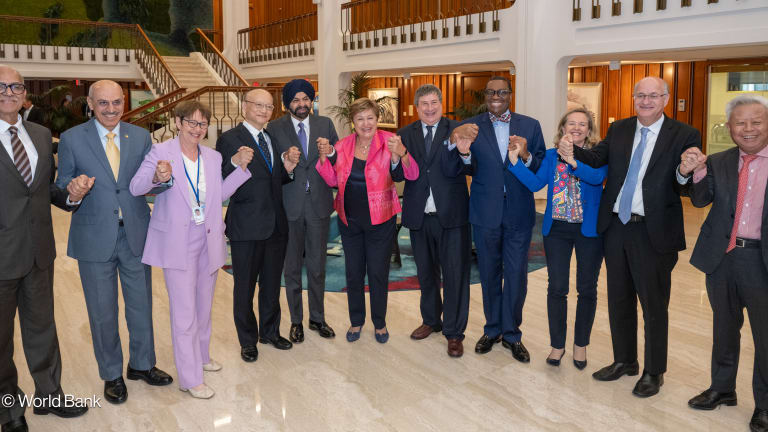
Decision-makers and thought leaders in all sectors need to adopt innovative strategies to master today’s global challenges. That requires a new understanding of leadership, which embraces multiperspectivity as an opportunity. The Global Leadership Academy has developed innovative approaches to the development of such leadership skills.
The Sustainable Development Goals — relating to climate, poverty, and health, for example — show that the social, ecological, and economic aspects of humanity’s most urgent challenges are inextricably linked. At the same time, the inflexible structures of many institutions mean that potential solutions are often developed and implemented in silos. A large number of these approaches neither address the problems’ complexities nor their interdependencies. This limits their effectiveness and prevents sustainable transformation.
There is a need for an approach that brings together decision-makers and stakeholders from all relevant sectors and establishes innovative forms of collaboration. What form could an approach of this kind take? Against a background of entrenched institutional structures, it is people who can make a difference: Networking and joint initiatives can overcome silo-ed thinking and transform structures.
“Against a background of entrenched institutional structures, it is people who can make a difference: Networking and joint initiatives can overcome silo-ed thinking and transform structures.”
—This mindset requires new abilities from thought leaders: They must be able to exploit multiperspectivity as a resource. For this reason, personal development on the part of decision-makers and influencers is key to sustainable transformation — and a very promising approach with regard to implementing development policy goals. In other words, we need decision-makers who act differently, but will that be sufficient or do we need to go one step further and rethink leadership itself?
Generating sustainable changes on personal, organizational, and systemic levels
Leadership cannot be considered independently of context: The organizational environment and associated processes shape actors’ behavior, while their personal leadership and collaboration styles have an impact on the structures. The dynamic between leaders and the organizational environment is itself embedded in a broad societal context, and one impacts the other. In short, this is a complex system that can be influenced substantially at the level of human relationships.
From a holistic perspective, leadership, above all else, has the potential to trigger system-wide learning and transformation processes. With this in mind, successful leadership means creating space for communication and understanding, and for creative interaction with the goal of collaborative action. Of critical importance is a capacity for dialogue and an ability to inspire and motivate others.
The five elements of leadership development
To strengthen cross-sectoral networking, decision-makers and thought leaders need to become more self-reflective and develop their skills. The following five principles have proved crucial in our work:
• Fostering a reflective and dialogue-focused mindset.
• Understanding and navigating systemic dynamics and one’s own role.
• Reconnecting with one’s own values and inner drive for change.
• Fostering a willingness to take action and to assume responsibility.
• Building relationships, trust, and encouraging cross-sectoral cooperation.
This is the approach pursued by our Global Leadership Academy, an international program undertaken on behalf of the German Federal Ministry for Economic Cooperation and Development and implemented by GIZ. We offer change agents, thought leaders, and opinion shapers from all sectors the opportunity to further develop their abilities in terms of influencing systems and interacting with people, at the following three levels:
Personal level: We promote personal development through self-reflection and improved communication, leadership, and innovation skills.
Organizational level: We inspire participants to initiate change in their own networks and institutions through dialogue-based approaches.
Systemic level: We enable participants to think holistically, cutting across national, sectoral and cultural boundaries, and to act collaboratively.
We are aware of the diverse contexts in which change agents operate worldwide, so we do not offer ready-made, top-down training solutions. Instead, we advocate approaches without predefined outcomes that give participants scope to look for innovative techniques and working methods that are appropriate to their field. To this end, the Global Leadership Academy employs the social laboratory concept — an open space for multistakeholder learning and experimentation. Every Lab focuses on one aspect of sustainable transformation of global significance, and brings together change agents across national and sectoral boundaries.
Leading the effort to promote beneficial migration
One issue of particular concern to the global community and in need of coordinated efforts is migration. However, migration issues are dominated one-sidedly by government politics, with little in the way of intersectoral dialogue or influence.
The Global Leadership Academy’s Migration Laboratory, jointly implemented with GIZ’s sector project Migration and Development, was held between October 2017 and May 2018 and gave participants from 18 nations an opportunity to bridge regional and sectoral divides. In the Lab, which took place within the framework of the Moroccan-German co-chairmanship of the Global Forum on Migration and Development, participants were able to develop, try out, and practice new forms of cross-functional dialogue and collaboration. The dialogical exchange of perspectives and mutual feedback created an atmosphere of trust and inspired participants to develop their own ideas for cross-sectoral change initiatives in the field.
Although we carefully prepared the methodological approach and structure of the Lab, we did not impose any constraints beyond the topic to be discussed. This meant that the Lab was shaped by the issues and questions that participants raised and developed together. It gave rise to ownership of the participants: They were given latitude to assume personal responsibility, show initiative, share ideas, and build relationships.
Upon conclusion of the Lab in May 2018, the jointly developed change initiatives had reached an advanced stage. The Global Compact for Safe, Orderly and Regular Migration that is currently being negotiated offers a tangible opportunity for implementing the proposals. The Global Compact for Migration contains actionable commitments for which the proposals provide answers: Strategies for the multisectoral implementation of action on migration that will benefit the countries of origin, receiving societies, and migrants themselves.
Moreover, the Lab created a sense of community, and a desire to maintain that community going forward. Participants are currently discussing what form and function their network will take and how the methods applied in the Lab can be incorporated into the structures of other bodies, such as the Global Forum on Migration and Development.
The significant momentum generated by the Lab shows that the underlying approach — the development of self-reflective and diversity-sensitive leadership — has the potential to involve a broader range of interest groups through innovative, dialogue-driven processes and to bring about more comprehensive transformation.
Discover more about the Global Leadership Academy, commissioned by the German Federal Ministry for Economic Cooperation and Development and implemented by GIZ, here.





